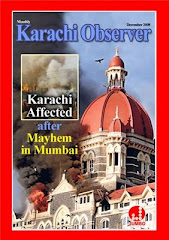
More than 100 people have been arrested in Pakistan as part of a crackdown on groups accused of having connections to last year's attacks in Mumbai, a Pakistani official said Thursday.
Most of those arrested are alleged members of Lashkar-e-Taiba, the militant organization suspected of being behind the deadly attacks.
"We have arrested a total 124 mid-level and top leaders," Interior Ministry chief Rehman Malik said during a press conference on Thursday, according to a Reuters report.
Pakistani authorities also closed several suspected militant training camps run by Lashkar-e-Taiba as part of the crackdown, which began in December after the United Nations Security Council declared that Jamaat-ud-Dawa, a Pakistani charity, was acting as a front for the banned militant group.
Authorities also took steps against 20 offices, 87 schools, two libraries, seven religious schools and a handful of other organizations and websites linked to the charity.
It was not immediately clear how many people remained in custody Thursday, as Malik suggested many may now just be under surveillance.
Among those in detention or under house arrest are Hafiz Mohammed Saeed, the head of the charity, who helped establish the militant group, and Zaki-ur-Rehman Lakhvi and Zarrar Shah, two men India alleges planned the Mumbai attacks.
Intelligence officials, cited in Indian media, have said Shah is Lashkar's communications chief and created a system that allowed the group's leaders to stay in touch with the gunmen during the siege on India's financial capital last November, which killed 171 people, including two Canadians.
U.S. officials have said Lakhvi has also directed Lashkar-e-Taiba operations in Chechnya, Bosnia and Southeast Asia, where he allegedly trained members to carry out suicide bombings.
Saeed has denied his organization was involved in terrorist activity and decried the accusation as an attack on religious groups.
More evidence needed for prosecution
Most of those arrested are alleged members of Lashkar-e-Taiba, the militant organization suspected of being behind the deadly attacks.
"We have arrested a total 124 mid-level and top leaders," Interior Ministry chief Rehman Malik said during a press conference on Thursday, according to a Reuters report.
Pakistani authorities also closed several suspected militant training camps run by Lashkar-e-Taiba as part of the crackdown, which began in December after the United Nations Security Council declared that Jamaat-ud-Dawa, a Pakistani charity, was acting as a front for the banned militant group.
Authorities also took steps against 20 offices, 87 schools, two libraries, seven religious schools and a handful of other organizations and websites linked to the charity.
It was not immediately clear how many people remained in custody Thursday, as Malik suggested many may now just be under surveillance.
Among those in detention or under house arrest are Hafiz Mohammed Saeed, the head of the charity, who helped establish the militant group, and Zaki-ur-Rehman Lakhvi and Zarrar Shah, two men India alleges planned the Mumbai attacks.
Intelligence officials, cited in Indian media, have said Shah is Lashkar's communications chief and created a system that allowed the group's leaders to stay in touch with the gunmen during the siege on India's financial capital last November, which killed 171 people, including two Canadians.
U.S. officials have said Lakhvi has also directed Lashkar-e-Taiba operations in Chechnya, Bosnia and Southeast Asia, where he allegedly trained members to carry out suicide bombings.
Saeed has denied his organization was involved in terrorist activity and decried the accusation as an attack on religious groups.
More evidence needed for prosecution
While Pakistan has received some information from India, authorities will need to obtain more evidence if Pakistan hopes to prosecute any of those arrested, Malik said.
Investigators in Pakistan will "have to inquire into this information to try to transform it to evidence, evidence which can stand the test of any court in the world and of course our own court of law," Malik said.
He did not provide details, and avoided a question as to whether the Pakistani government was admitting the attack was staged by militants from its own country.
"We have to prove to the world that India and Pakistan stand together against terrorists because they are the common enemies," Malik said.
The Mumbai attacks have increased tensions between the two nuclear rivals, as India has demanded that Pakistan take action against the militants.
Indian Prime Minister Manmohan Singh earlier this month said evidence suggested the attack must have had the support of some official agencies in Pakistan.
India has called on Pakistan to hand over any suspects to New Delhi, but the country has said it will try any people involved in the attacks in its own courts.
Malik also appeared to rule out the possibility of extradition on Thursday, saying Pakistani laws allowed for the prosecution of citizens who committed crimes elsewhere. (CBC News)



















No comments:
Post a Comment